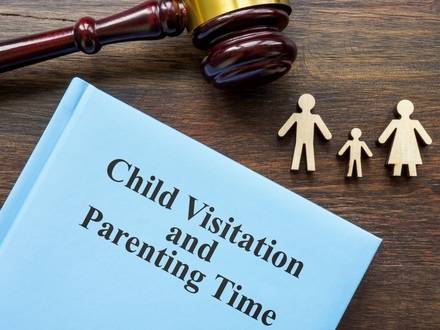Recent Blog Posts
My Ex Refuses to Pay Child Support. Can I Withhold Their Parenting Time?
Posted on January 12, 2026 in Child Support
 When your ex-spouse stops paying child support, it can feel like a betrayal. You may be tempted to fight back by refusing to let them see the children. While this reaction is understandable, Illinois law does not allow parents to take matters into their own hands like this.
When your ex-spouse stops paying child support, it can feel like a betrayal. You may be tempted to fight back by refusing to let them see the children. While this reaction is understandable, Illinois law does not allow parents to take matters into their own hands like this.
Child support and parenting time are separate legal issues in 2026. Withholding one because of problems with the other can get you into serious legal trouble. If your ex is not paying child support, our Wheaton, IL child support lawyers can help you take the right steps to hold them responsible.
Not Paying Child Support Isn’t a Legal Reason to Stop Your Child From Seeing Your Ex
Because child support and parenting time are two separate things in Illinois, the parent who is supposed to receive child support cannot just decide to keep the children away from the other parent if payments are late. If you withhold parenting time without a court order, you could face serious consequences.
Continue Reading ››
How Can a Child Support Order Be Modified in Illinois?
Posted on January 06, 2026 in Child Support
 After your divorce finalizes and child support payments begin, life does not stand still. Jobs and income change, as do growing children’s needs. As these changes happen, you may wonder whether your current child support order still makes sense.
After your divorce finalizes and child support payments begin, life does not stand still. Jobs and income change, as do growing children’s needs. As these changes happen, you may wonder whether your current child support order still makes sense.
Illinois law recognizes that circumstances change and provides parents with options to modify child support orders under certain circumstances. If you want more information about asking the court to change your child support order in 2026, call our Wheaton, IL child support lawyers today.
When Can I Modify My Child Support Order in Illinois?
Illinois law allows child support orders to be modified for a few reasons:
Could a Demanding or Irregular Work Schedule Impact Custody?
Posted on December 30, 2025 in Child Custody
 A demanding or irregular work schedule can affect child custody decisions, known as the allocation of parental responsibilities in Illinois. However, it does not automatically count against you. Courts focus on how a parent’s schedule impacts the child’s daily life, stability, and well-being.
A demanding or irregular work schedule can affect child custody decisions, known as the allocation of parental responsibilities in Illinois. However, it does not automatically count against you. Courts focus on how a parent’s schedule impacts the child’s daily life, stability, and well-being.
Many parents work nights, rotating shifts, long hours, or travel-heavy jobs. If you have questions about your custody case, the DuPage County, IL child custody lawyers at Andrew Cores Family Law Group can help.
How Do Illinois Courts Decide Custody When a Parent Works Long or Irregular Hours?
Illinois courts do not punish parents for having demanding jobs. Instead, judges look at whether a parent can still meet the child’s needs. Custody decisions are guided by the "best interests of the child" standard found in the Illinois Marriage and Dissolution of Marriage Act.
Continue Reading ››
Is My Illinois Divorce Going To Be Public?
Posted on December 25, 2025 in Divorce
 As of 2025, Illinois divorce cases are still filed through the court system. This means some level of public access usually exists. But not every detail is easy to find, and you can protect some information in certain situations.
As of 2025, Illinois divorce cases are still filed through the court system. This means some level of public access usually exists. But not every detail is easy to find, and you can protect some information in certain situations.
If you're thinking about divorce, the Wheaton, IL divorce lawyers at Andrew Cores Family Law Group can explain what goes on the public record, what stays private, and how you might protect your personal details. How public your divorce becomes depends on how you handle the case and what issues come up.
What Does It Mean for a Divorce to Be Public in Illinois?
When a divorce is described as public, it means the case is filed in court and becomes part of the court record. Divorce cases are handled through the circuit courts and become part of the court record unless a judge orders otherwise. Once a case is filed, basic information about the case usually becomes available through court records.
Continue Reading ››
What Income Counts for Child Support in Illinois?
Posted on December 21, 2025 in Child Custody
 In Illinois, child support is based on a broad view of income, not just a paycheck. This matters for parents trying to budget, plan, or resolve support questions during or after a divorce. Courts consider multiple income sources to ensure that child support arrangements accurately reflect a parent’s ability to contribute.
In Illinois, child support is based on a broad view of income, not just a paycheck. This matters for parents trying to budget, plan, or resolve support questions during or after a divorce. Courts consider multiple income sources to ensure that child support arrangements accurately reflect a parent’s ability to contribute.
As of 2025, Illinois continues to use the income shares model for child support, which considers both parents’ incomes and the child's needs. If you have concerns about how income will be calculated in your case, our experienced DuPage County, IL child support lawyers can help.
What Does Illinois Consider Income for the Purpose of Child Support Calculations?
Illinois child support is governed by the Illinois Marriage and Dissolution of Marriage Act. Section 750 ILCS 5/505 explains how courts calculate support and what income is considered.
Continue Reading ››
Can You Back Out of Divorce Mediation After You Start in Illinois?
Posted on December 15, 2025 in Mediation
 Many couples in DuPage County choose mediation as a way to resolve their divorce issues outside of court. The process offers privacy and can reduce conflict, but it doesn't always lead to the results both spouses want.
Many couples in DuPage County choose mediation as a way to resolve their divorce issues outside of court. The process offers privacy and can reduce conflict, but it doesn't always lead to the results both spouses want.
When mediation stalls or feels unproductive, there is no reason to feel stuck, since you are not under any obligation to continue. Understanding when and how to step away can help you make the best choice for your situation. Our Wheaton, IL divorce lawyer can guide you as you decide what to do next.
What Are Good Reasons To Stop Divorce Mediation?
Mediation works well for some families but not for all. If it doesn’t work for yours, that does not mean that you failed. It simply shows that this type of dispute resolution doesn’t suit your family’s unique needs. Some common reasons to drop the mediation process include:
Continue Reading ››
Can I Change the Visitation Schedule Now That My Child Is Older?
Posted on December 08, 2025 in Child Custody
 As children grow, their schedules, interests, and needs evolve. A parenting time plan that worked when your child was in elementary school may no longer fit a teenager’s busy routine. When that happens, it may be time for a change. Our knowledgeable DuPage County, IL child custody lawyer can help you petition for modification and ensure you have sufficient evidence that the change would benefit your child.
As children grow, their schedules, interests, and needs evolve. A parenting time plan that worked when your child was in elementary school may no longer fit a teenager’s busy routine. When that happens, it may be time for a change. Our knowledgeable DuPage County, IL child custody lawyer can help you petition for modification and ensure you have sufficient evidence that the change would benefit your child.
Why Might You Need To Change Parenting Time as a Child Ages?
Some reasons you might need to change a parenting time plan as your child grows older include:
How Do You Handle Divorce in Illinois When Your Spouse Controls the Money?
Posted on December 04, 2025 in Asset Division
 Many questions come up when people find themselves considering divorce. The process can be complicated at the best of times, but if one spouse controls the money, divorce can seem even harder to navigate for the other spouse.
Many questions come up when people find themselves considering divorce. The process can be complicated at the best of times, but if one spouse controls the money, divorce can seem even harder to navigate for the other spouse.
In Illinois, the law protects both spouses, even when one person controls the finances. You still have the right to financial support, access to records, and a fair share of marital property. With help from an experienced Wheaton, IL divorce lawyer, you can move forward with your divorce in a more financially stable position.
How Do I Leave My Spouse When I Do Not Have Access to Our Money?
When your spouse handles every account and controls spending, it can feel impossible to leave. However, Illinois law strives to find fair solutions for everyone. Under 750 ILCS 5/501(a)(1), the court can grant temporary financial support while your divorce is not yet finalized. This support can cover rent, food, and legal costs, giving you time to prepare for long-term financial independence.
Continue Reading ››
Can You Live Together While Getting Divorced in Illinois?
Posted on November 30, 2025 in Divorce
 In Illinois, you and your spouse can live together during your divorce. However, doing so can bring both practical and legal challenges. Before you start your divorce, you must understand what living together during the proceedings can mean for finances, custody, and your emotional well-being. The experienced DuPage County, IL divorce lawyers at Andrew Cores Family Law Group can help you make choices that protect your comfort and rights.
In Illinois, you and your spouse can live together during your divorce. However, doing so can bring both practical and legal challenges. Before you start your divorce, you must understand what living together during the proceedings can mean for finances, custody, and your emotional well-being. The experienced DuPage County, IL divorce lawyers at Andrew Cores Family Law Group can help you make choices that protect your comfort and rights.
Does Illinois Law Say Anything About Living Together While Getting a Divorce?
Illinois law does not require couples to live separately before filing for divorce. Under Section 401(a) of the Illinois Marriage and Dissolution of Marriage Act, you can obtain a divorce if your marriage has broken down irretrievably, regardless of whether you share a home. The law once required spouses to live "separate and apart" for a certain time before divorcing, but this rule was eliminated. Now, what matters is proving that the relationship cannot be repaired.
Continue Reading ››
How To Dispute Paternity in Illinois
Posted on November 25, 2025 in Paternity
 Disputing paternity means you want the court to review whether you are the child’s biological father. In Illinois, you can challenge paternity if you believe that the original paperwork or court ruling was wrong. However, you have to follow strict time limits and legal steps to do so. A knowledgeable Wheaton, IL paternity lawyer can guide you through each part of the process.
Disputing paternity means you want the court to review whether you are the child’s biological father. In Illinois, you can challenge paternity if you believe that the original paperwork or court ruling was wrong. However, you have to follow strict time limits and legal steps to do so. A knowledgeable Wheaton, IL paternity lawyer can guide you through each part of the process.
When Can You Challenge Paternity in Illinois?
Under the Illinois Parentage Act of 2015, paternity can be disputed under certain circumstances. Maybe you signed a Voluntary Acknowledgment of Paternity (VAP) by mistake, or you were pressured or misled into signing it. A VAP is a legal form that names you as a child’s father without going to court, and it legally binds you to that child. According to 750 ILCS 46/309, if you signed a VAP and think it was a mistake, you must challenge it within two years of learning new facts that suggest you are not the biological father.
Continue Reading ››







 When your ex-spouse stops paying
When your ex-spouse stops paying  After your divorce finalizes and
After your divorce finalizes and A demanding or irregular work schedule can affect child custody decisions, known as the
A demanding or irregular work schedule can affect child custody decisions, known as the  As of 2025,
As of 2025,  In Illinois,
In Illinois,  Many couples in DuPage County choose
Many couples in DuPage County choose  As children grow, their schedules, interests, and needs evolve. A
As children grow, their schedules, interests, and needs evolve. A  Many questions come up when people find themselves considering
Many questions come up when people find themselves considering  In Illinois, you and your spouse can live together during your
In Illinois, you and your spouse can live together during your  Disputing
Disputing 
